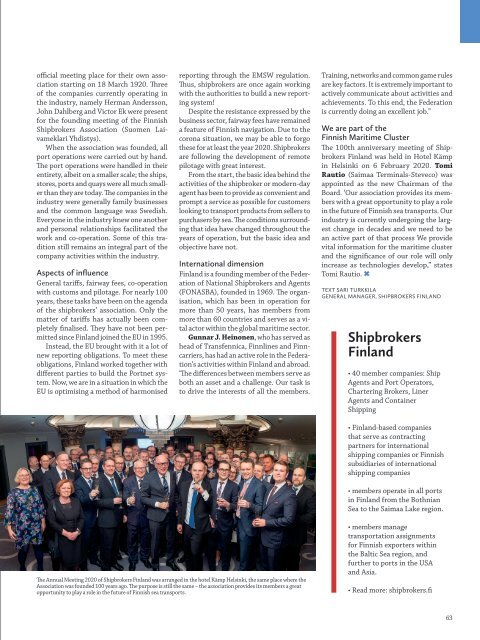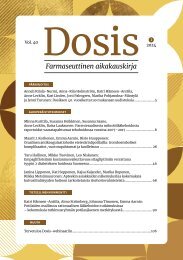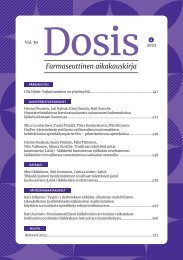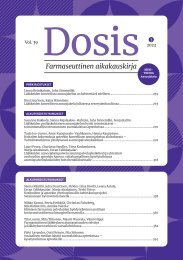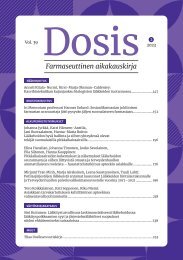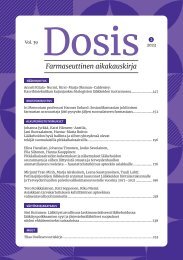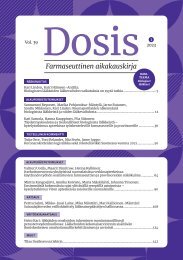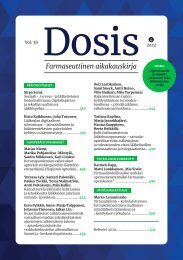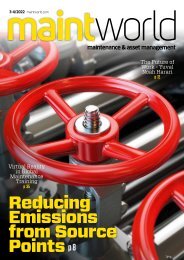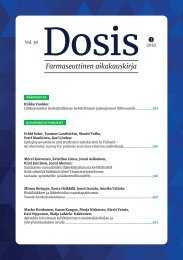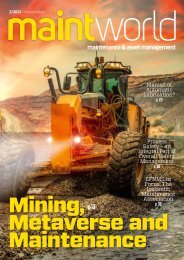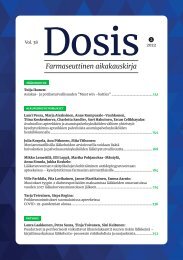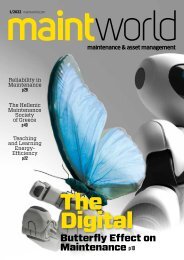Create successful ePaper yourself
Turn your PDF publications into a flip-book with our unique Google optimized e-Paper software.
official meeting place for their own association<br />
starting on 18 March 1920. Three<br />
of the companies currently operating in<br />
the industry, namely Herman Andersson,<br />
John Dahlberg and Victor Ek were present<br />
for the founding meeting of the <strong>Finnish</strong><br />
Shipbrokers Association (Suomen Laivameklari<br />
Yhdistys).<br />
When the association was founded, all<br />
port operations were carried out by hand.<br />
The port operations were handled in their<br />
entirety, albeit on a smaller scale; the ships,<br />
stores, ports and quays were all much smaller<br />
than they are today. The companies in the<br />
industry were generally family businesses<br />
and the common language was Swedish.<br />
Everyone in the industry knew one another<br />
and personal relationships facilitated the<br />
work and co-operation. Some of this tradition<br />
still remains an integral part of the<br />
company activities within the industry.<br />
Aspects of influence<br />
General tariffs, fairway fees, co-operation<br />
with customs and pilotage. For nearly 100<br />
years, these tasks have been on the agenda<br />
of the shipbrokers’ association. Only the<br />
matter of tariffs has actually been completely<br />
finalised. They have not been permitted<br />
since Finland joined the EU in 1995.<br />
Instead, the EU brought with it a lot of<br />
new reporting obligations. To meet these<br />
obligations, Finland worked together with<br />
different parties to build the Portnet system.<br />
Now, we are in a situation in which the<br />
EU is optimising a method of harmonised<br />
reporting through the EMSW regulation.<br />
Thus, shipbrokers are once again working<br />
with the authorities to build a new reporting<br />
system!<br />
Despite the resistance expressed by the<br />
business sector, fairway fees have remained<br />
a feature of <strong>Finnish</strong> navigation. Due to the<br />
corona situation, we may be able to forgo<br />
these for at least the year <strong>2020</strong>. Shipbrokers<br />
are following the development of remote<br />
pilotage with great interest.<br />
From the start, the basic idea behind the<br />
activities of the shipbroker or modern-day<br />
agent has been to provide as convenient and<br />
prompt a service as possible for customers<br />
looking to transport products from sellers to<br />
purchasers by sea. The conditions surrounding<br />
that idea have changed throughout the<br />
years of operation, but the basic idea and<br />
objective have not.<br />
International dimension<br />
Finland is a founding member of the Federation<br />
of National Shipbrokers and Agents<br />
(FONASBA), founded in 1969. The organisation,<br />
which has been in operation for<br />
more than 50 years, has members from<br />
more than 60 countries and serves as a vital<br />
actor within the global maritime sector.<br />
Gunnar J. Heinonen, who has served as<br />
head of Transfennica, Finnlines and Finncarriers,<br />
has had an active role in the Federation’s<br />
activities within Finland and abroad.<br />
‘The differences between members serve as<br />
both an asset and a challenge. Our task is<br />
to drive the interests of all the members.<br />
Training, networks and common game rules<br />
are key factors. It is extremely important to<br />
actively communicate about activities and<br />
achievements. To this end, the Federation<br />
is currently doing an excellent job.”<br />
We are part of the<br />
<strong>Finnish</strong> <strong>Maritime</strong> <strong>Cluster</strong><br />
The 100th anniversary meeting of Shipbrokers<br />
Finland was held in Hotel Kämp<br />
in Helsinki on 6 February <strong>2020</strong>. Tomi<br />
Rautio (Saimaa Terminals-Steveco) was<br />
appointed as the new Chairman of the<br />
Board. ‘Our association provides its members<br />
with a great opportunity to play a role<br />
in the future of <strong>Finnish</strong> sea transports. Our<br />
industry is currently undergoing the largest<br />
change in decades and we need to be<br />
an active part of that process We provide<br />
vital information for the maritime cluster<br />
and the significance of our role will only<br />
increase as technologies develop,” states<br />
Tomi Rautio. ✖<br />
TEXT SARI TURKKILA<br />
GENERAL MANAGER, SHIPBROKERS FINLAND<br />
Shipbrokers<br />
Finland<br />
• 40 member companies: Ship<br />
Agents and Port Operators,<br />
Chartering Brokers, Liner<br />
Agents and Container<br />
Shipping<br />
• Finland-based companies<br />
that serve as contracting<br />
partners for international<br />
shipping companies or <strong>Finnish</strong><br />
subsidiaries of international<br />
shipping companies<br />
• members operate in all ports<br />
in Finland from the Bothnian<br />
Sea to the Saimaa Lake region.<br />
The Annual Meeting <strong>2020</strong> of Shipbrokers Finland was arranged in the hotel Kämp Helsinki, the same place where the<br />
Association was founded 100 years ago. The purpose is still the same – the association provides its members a great<br />
opportunity to play a role in the future of <strong>Finnish</strong> sea transports.<br />
• members manage<br />
transportation assignments<br />
for <strong>Finnish</strong> exporters within<br />
the Baltic Sea region, and<br />
further to ports in the USA<br />
and Asia.<br />
• Read more: shipbrokers.fi<br />
63


